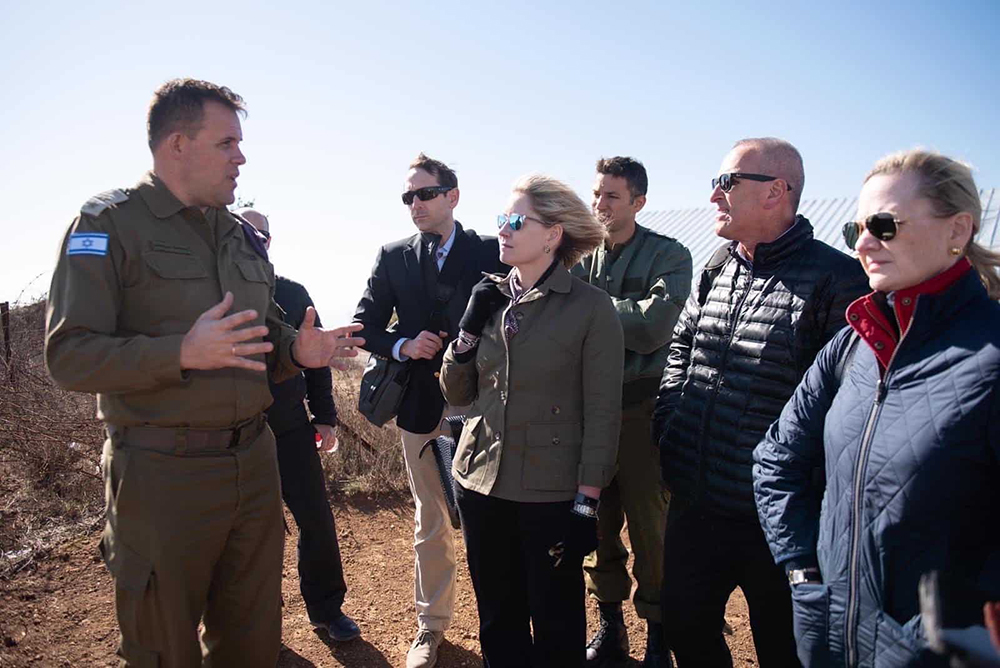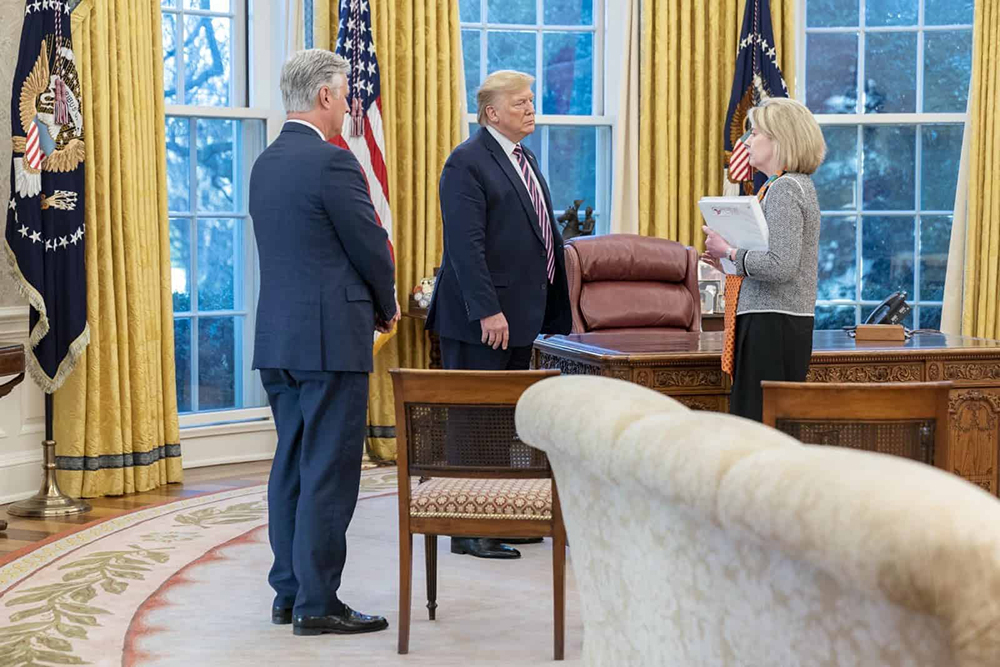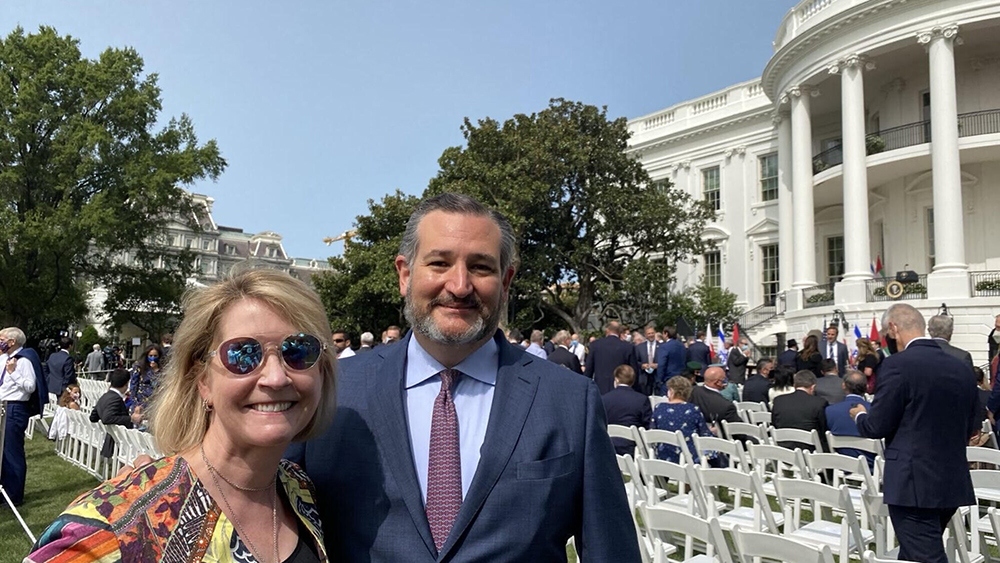|
Getting your Trinity Audio player ready...
|
Victoria Coates told JNS of Israeli-Saudi normalization, “I bet dollars to doughnuts that President Trump will get that done.”
By: Menachem Wecker
Victoria Coates first went to Israel 10-and-a-half years ago, in May 2014, with Sen. Ted Cruz (R-Texas), for whom she was senior national security adviser. “At this point, I actually have no idea how many times I’ve been there,” Coates told JNS in her art-filled office at Heritage Foundation, where she is vice president of the national security and foreign policy institute.
Coates’s favorite trip to the Jewish state was during Christmas in 2019. “I was there with my husband, and we go into the room at the King David and there’s a card on the table that says ‘Dear guest,’ you know whatever. And they scratched it out and they wrote, ‘Dear Dr. Coates, welcome home,’” she told JNS. “My husband said, ‘That’s sweet, but do you realize you don’t live here?’ Actually right now, I don’t know.”
During a wide-ranging interview with JNS, which ran about an hour, Coates wore necklaces with a Jerusalem cross and a Philadelphia Eagles logo. She is Christian and divides her time between Washington and the City of Brotherly Love. The former deputy national security advisor for the Middle East and North Africa under President Donald Trump is also a staunch Zionist, whose book The Battle for the Jewish State: How Israel—and America—Can Win is due out on Dec. 17 from Encounter Books.
“The purpose of this book is to explain why the pro-Israel side is correct and to chart a safe course at a moment when the U.S.-Israel alliance hangs in the balance,” she writes in the book, which she penned before the outcome was known of the November U.S. presidential election. (“I really wish the Israelis had tipped me off that they were going to take out Nasrallah and Sinwar,” she told JNS, referring to senior leaders of Hezbollah and Hamas. “I would have liked to include that.”)

Regardless of who won the election, “the good news is that the pro-Israel side still comprises a significant majority of Americans, but with the balance shifting among the younger demographic,” she writes, “we cannot assume that it will prevail without concerted effort against an increasingly aggressive threat.”
She notes in the book the difference, which “could not be more stark,” between the “successful, if unorthodox, approach to the Middle East under President Trump and the decades of bipartisan failure most recently manifested in the Biden-Harris administration.”
Coates was in Israel in July 2014 when Phil Gordon, an adviser to President Barack Obama, delivered a speech. “As the rockets were starting to fly, he said, ‘You’ve got to give them a state,’” she told JNS. “I was going to Naftali Fraenkel’s shiva and I’m like, there’s something wrong here with these people and with what they’re doing.” (The latter was one of the teens kidnapped from Gush Etzion and murdered.)
“Being in the administration, and being on the inside and so close to what actually happens, that’s where I think it was important that it’s somebody who’s not Jewish, who is American to say, ‘Here is the value.’ I am Christian,” she said. “But the value of the relationship transcends my religious interest in the Holy Land.”
‘Discontinued education’
Coates holds undergraduate, graduate and doctoral degrees in art history. Her first book, in 2016, was David’s Sling: A History of Democracy in Ten Works of Art. She told JNS that she hopes to do another such history, in 12 works of art, of Christianity.
“I really wish I could have a time machine and go back because I was one credit shy of a double major with political science and assumed I was going to be an art historian at that point, so I didn’t really care,” she said. “But it would have been helpful to explain it.”
She went through graduate school and “did the gypsy scholar circuit,” settling at the University of Pennsylvania for her doctorate. She had kids and worked on some projects and taught a lot in what “is now in hindsight the time when academia really started to polarize,” she said.
“It just became poisonous, and I’ve always been very conservative,” she said. “Maybe not by Kevin standards,” she added with a laugh, referring to Kevin D. Roberts, the president of the Heritage Foundation.
Coates started writing about national security issues, mainly about the Iraq war and the role of Donald Rumsfeld, then the U.S. defense secretary, in the war, for the blog RedState.
“After he retired, he got in touch and said, ‘Do you know any academics who can help me with my books? I’m going to write this big, huge book and use all these documents,’” Coates said. “I said, ‘No. They all think you have horns and a tail.’ My husband was the one who said, ‘Look you’re not happy. Why don’t you do it?’”

She worked as Rumsfeld’s research director and then was senior adviser to the 2012 presidential campaign of Rick Perry, then the Texas governor. The following year, she joined Cruz’s Senate office. Even as she has swapped art history for foreign policy, however, Coates has retained elements of her scholarly toolkit.
“I approached the book like a 101 syllabus, assuming an educated audience. Assuming an audience that is able to consume a lot of material,” she told JNS. “It was my mother who asked for the acronym list. She’s a pretty bright woman, and she said, ‘I am getting lost. You need a list. I just need somewhere to go. There are so many acronyms. There are so many names.’”
In a college course, a professor has three months, essentially, to teach students a base level of information. “It was always my approach that you do that better with illustrative stories and characters they can trace, so they develop a framework,” Coates said.
“For some, that’s the only class they’ll take and they feel good, and that was very much part of the point of the book—to arm specifically an American audience with, why does this matter?” she added. “Others go on to graduate work, but that foundation is what you lay, and there is an art to doing that as an educator.”
Historical arcs
Throughout the forthcoming book, Coates traces narrative arcs, including those that span decades. “Fifty years ago, Arafat thus laid the foundation for the pro-Hamas response to Oct. 7, 2023, in America, appropriating the American founders, notably Washington, for the Palestinian cause,” she writes, “and making Israel, and Jews in general, who opposed the invitation for a terrorist mastermind to speak at the United Nations, the agents of ‘enmity and hostility.’”
“My favorite one,” she told JNS, “is actually the Saudi trajectory.”
That, to Coates, led from the emergence of AIPAC as a major force in the early 1980s and the “terrible concerns” about airborne warning and control systems (AWACS), whose sale to the kingdom President Ronald Reagan announced in 1981, and Washington’s guarantee that Israel would have a qualitative military edge (QME) to “openly discussing the Saudi-Israel deal.”
“I don’t know that we’re going to get it done next year, but I bet dollars to doughnuts that President Trump will get that done,” she told JNS.
After serving on the White House National Security Council, Coates advised Dan Brouillette, the U.S. energy secretary at the time, on national security in early 2020. In that role, she spent time in Saudi Arabia that autumn.
“This is not your father’s Riyadh,” she told JNS of the Saudi capital. “It is changing from visit to visit.”
At the Energy Department, Coates wasn’t able to move around during the COVID-19 pandemic. “So the secretary had me go to Abu Dhabi for two months over the summer of that year and then come home and then go to Riyadh for two months,” she said. “It was seismic in the kingdom to contemplate the possibility that a candidate, who had threatened to treat them as a ‘pariah,’ might become president.”

On one of her office shelves, Coates has a miniature of the Barakah nuclear power plant in Abu Dhabi, which she calls “one of my favorite items.”
For Coates, it was a “fascinating time” to be in the kingdom.
“They gave me permission to go everywhere, so I was all over the country. I went out to Dhahran, the headquarters of Aramco, where I drove a car. Everybody came out, and they took pictures,” she told JNS. “It wasn’t because the consul general out there was a woman and I was a woman, and we were in a car. They were taking pictures of it because it was a hydrogen car. That’s how different it is.”
“Is everything perfect? No. But it is changing fast, and that is momentous for the Middle East,” she added.
Conversations that used to only occur quietly—and never with a journalist—now take place in the open. “Now everyone’s like, ‘when, not if. We’ll get Gaza resolved,” she said. “That’s all due to Trump and the policies that he laid out originally in that AIPAC speech in 2016.”
“He deserves the Peace Prize for that, and, of course, it wasn’t even considered,” she said.
To Coates, neither the current Israeli government nor the Saudi government had confidence in the Biden administration, which she thinks was the one insisting that the Palestinian question must be a prerequisite for further Abraham Accords progress.
“More perhaps than ‘pariah,’ it was the monkeying with the strategic petroleum reserve, which is a very artificial, distorting way to try to adjust prices,” Coates said. “Just very counter to anything. For them, this is a business, not a political messaging tool.”
Not out of left field
When Coates considers Jew-hatred today, she notes that “in many ways, the Holocaust was the catalyst, but the origins of it obviously go back, certainly, 100 years.”
“This didn’t come out of left field,” she said.
“I hate to date myself, but this is helpful. When I was born, Israel was 20 years old. Israel is now 76 years old. Wild difference over the course of those 56 years,” she said. “The reality that emerged in the mid-1970s that the Arab nations weren’t going to attack again. They were sick of it.”
The mistake, she said, was the United Nations inviting Yasser Arafat, leader of the PLO, “and somehow suggesting they were a de facto state, which they just weren’t.”
“That’s the point in the book. This isn’t fair to them. They have none of the trappings of statehood. They never were a state. They have no way to manage a state and insisting that they be one to placate your domestic population is no service to the Palestinians,” she said.
The “actually reasonable situation” in the 1980s then “disintegrates into the intifada,” followed by the “desperate ‘Hail Mary’ of Oslo, which just abjectly failed,” according to Coates.
“Here we are in 2024, and I’ll have to look. I think Israel is No. 18 on the U.S. News and World Report list of most powerful nations, and the Palestinians are not a state,” she said. “If you insist they’re apples and apples, when you’re dealing with apples and oranges, you cannot get to a resolution.” (Israel ranks 10th on the U.S. News list.)
“My recommendation is: Israel has to win,” she said.
One of the main points of her book, as the title articulates, is that the United States and the Jewish state are in this together.
When Israeli Prime Minister Benjamin Netanyahu addressed a joint session of the U.S. Congress on July 24, riots broke out in Washington, including at Union Station.
“We watched the 15-minute parade of protesters go right past the Heritage Foundation, down to Union Station and rip down those flags,” Coates told JNS. “Those weren’t Israeli flags. Those were American flags.”
“This is an American problem. It’s not a Jewish problem, and it’s not an Israeli problem, although it is a problem for both,” she said.
Some are saying that America isn’t reliable, and the Jewish state must be independent.
“For those of us who’ve actually done this, that is not possible right now, but it could be,” Coates said. “I think it’s in America and Israel’s interests to get there. It’s probably a 25-year journey. It’s probably a centennial thing. But how great for the United States to have an independent but closely linked ally—this beacon in the Middle East the rest of our partners and allies are integrated with.”
Would Coates like to join the new administration, JNS asked.
“I’m in a Zen place,” she said. “The incoming administration is going to have a sprint, not a marathon. From where we, as Heritage, sit, that is going to be extremely important, and so I am very happy being here, managing that.”
“Obviously, if they were to call, I would have the conversation, but it seems to me I’m probably most helpful for this initial period here,” she added. “We need a robust Heritage talking to them all day every day.”
Air defense
Early on in the interview, Coates told JNS that she wanted, before the conversation concluded, to discuss the book’s dedication.
“For my grandfather, U.S. Army Captain Howard Allen Downey, who stormed up Utah Beach in the D-Day invasion to liberate Europe from the Third Reich,” Coates writes in the book, “and for my mother, Anne Downey Gardner, whose namesake anti-aircraft gun, the ‘Baby Anne,’ was hunting Nazis when she was 6 months old.”
The dedication includes a photo of the “Baby Anne.”
Her grandfather was part of the second wave on D-Day, on June 6, 1944, “and then fought his way across Europe,” Coates said. Her mother was exactly 6 months old on D-Day, having been born on Dec. 6, 1943.
“He named his anti-aircraft gun after her and had her little pink shoes hanging over the gun. We have the shoes,” she said. “When she was in Israel for her 75th birthday, the then political director of the MFA and a senior guy at the IDF gave her this wonderful model of the three interceptors: Iron Dome, David’s Sling and Arrow.”
“It says on it, ‘Happy birthday Mrs. Gardner. Air defense has come a long way in 75 years,” Coates said.
(JNS.org)





